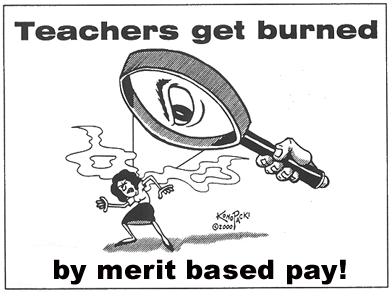
AP Bonus? No Thanks. (Polemic) By Francis Hahn
On Wednesday, June 25th, I was informed by the Human Resources Director at the Taos Municipal Schools that I had been selected to receive a $5000 ‘AP Stipend.’
According to Matt Pahl the Policy Director at the NM Public Education Department, AP test score data from 2012 qualified me to receive the money. Basically, because I teach the highest performing students in their final year of high school, I qualify for nice fat bonus check that the PED does not think other teachers deserve.
This is merit pay.
I’m being offered a bonus based on the performance of my students. No matter what the governor or the legislature chooses to call it, it is the very definition of merit pay.
While $5000 is an appealing sum to add to my income, I have decided to reject the money for the following reasons:
- Other English teachers at the High School and Middle School taught the same students, but not in their AP year, so they aren’t eligible for the bonus;
- Regular education teachers who don’t have AP students aren’t eligible for the bonus;
- Special education teachers aren’t eligible for the bonus;
- Elective teachers aren’t eligible for the bonus;
- Middle School teachers aren’t eligible for the bonus;
- Elementary and preschool teachers aren’t eligible for the bonus;
- Principals, vice principals, and other administrators aren’t eligible for the bonus;
- Secretaries, cooks, counselors, registrars, and custodians aren’t eligible for the bonus;
- I do not believe in merit pay as an equitable means of rewarding performance.
- I do believe believe that every teacher, administrator, TA, custodian, secretary, cook, counselor, and every other staff member of the Taos Municipal Schools plays an essential part in the education of the students and the maintenance of an effective school environment. It is not fair that any one teacher should be rewarded for the work that every employee contributes to.
I happen to be the guy who teaches the highest performing students in their final year of high school, but it takes twelve years of frustration, perseverance, thoughtfulness, dedication, and, above all, exceptionally good work on the part of all the staff to get them to the high watermark that they achieve by the time they finish school.
I can not, in good conscience, accept a bonus under the false pretense of assuming that our achievements are mine alone.
Giving me a bonus is a bit like giving a bonus to the construction worker who puts the finishing touches on a house. Many people built the house, so why should one guy get a bonus? Every employee’s work should be honored.
Aside from this, there are also a set of deeply troubling questions that come along with performance based merit pay. For example, if I know that I can earn a juicy bonus for the performance of my AP students, and I know that the way their success will be measured by the state is by their scores on the AP test, I might be inclined to emphasize the material that I know will be on the test to the detriment of other equally important information and skills that the test ignores. This is how merit pay influences curriculum.
Moreover, If the state offers bonuses for some subjects or levels but not for others (offering a bonus for AP but not for Special Education, for example), this will encourage a tendency among teachers to compete for classes that have attached bonuses.
I can hear the business community arguing that this would be a good thing – competition for these positions, they say, would insure that the best teachers get them. But, in practice, this is harmful to students precisely because it encourages teachers to compete to work with certain students (in this case, AP) to the detriment of other students (special and regular education). And It demoralizes the teachers stuck in positions that do not have attached bonuses.
I know some will argue that there are cases in which one employee’s work is exemplary and deserves recognition. However, I would prefer my peers to be the judges of my work and not an arbitrary benchmark set up by the PED, which does not take into account the many hands that molded the students before they set foot in my class.
I have sent the PED and the district a letter asking for an accurate accounting of the bonus money, and I will report what, if anything is done with this outlandish, divisive, inequitable waste of taxpayer money.
The idea that the state needs to offer me a bonus to get me to do my job is, frankly, insulting. Education isn’t Wall Street and teachers don’t work for bonuses.
We don’t answer to shareholders – we answer to our students.
Author bio:
Francis Hahn is a graduate of Taos High School in Taos, New Mexico, where he now teaches English and Poetry.



